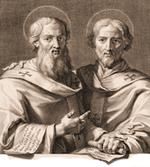Catholic World News News Feature
Bishops Lead Assault on Church Teachings March 20, 1997
In a sensational-- and scandalous-- public conference earlier this month, two American Catholic bishops participated in what can only be described as an assault on the Church's teaching regarding homosexuality. At a conference in Pittsburgh, sponsored by New Ways Ministry, Bishops Thomas Gumbleton of Detroit and Matthew Clark of Rochester, New York, encouraged homosexuals to be active in the Church, and suggested that in time the Catholic Church would approve homosexual unions.
Bishop Gumbleton-- who reports that he himself is heterosexual, but has been an active supporter of "gay" causes since learning that his brother is homosexual-- told the New Ways conference that homosexual priests should be open about the leanings. "I can't tell you the number of letters I have received from priests who say they are gay, but who are afraid to come out," he said. "What a loss that is to our Church!"
Oddly enough, Bishop Gumbleton's outrageous suggestion drew only a tepid response from the Diocese of Pittsburgh. Although the diocese had not approved the New Ways conference, a spokesman seemed to be carefully avoiding any direct criticism. When asked to comment on the Gumbleton suggestion that priests should "come out," Father Ronald Lengwin replied: "I have heard that it frees you to be yourself. But I also believe that there are areas of our life that are intended to be shared with God alone, in an intimate expression of faith and love."
Father Lengwin seemed to be going out of his way to avoid any clear statement of the traditional Catholic teaching: that homosexual acts are always seriously sinful, and that even homosexual inclinations are objectively disordered. In 1986, recognizing the mounting campaign to gain public acceptance of homosexuality, the Vatican Congregation for the Doctrine of the Faith issued a statement explicitly reaffirming that traditional teaching, and urging bishops to reject any effort to create confusion among the faithful, or to press for a change in Catholic doctrine. [For excerpts from that Vatican statement, see the CWN feature service for March 20, 1997.]
The conference sponsored by New Ways Ministry was precisely the sort of occasion against which the Vatican had warned: an organized demonstration of opposition to the Church teaching. Thus Sister Margaret Farley of Yale Divinity School made the astonishing assertion: "None of the sources of Christian ethics, I would argue, yields reasons to condemn homosexual acts or relationships as such."
What sort of people would participate in such an assault on Catholic tradition? The answer to that question highlights the danger to the Church. Francis DeBernardo, the head of New Ways Ministry, told a reporter that nearly half of the people attending the conference were Catholic priests or nun, and perhaps as many as 75 percent of the participants were engaged in some form of religious education or diocesan ministry. So the people who are being encouraged to distort the Church's teachings will now go back to their own diocesan jobs, and spread the message of dissent.
The lengths to which these educators may go to justify their position could be seen in one incident from the Pittsburgh conference. Bishop Gumbleton backed his support for homosexuals by quoting from the Catechism of the Catholic Church (2358):
"The number of men and women who have deep-seated homosexual tendencies is not negligible. They do not choose their homosexual condition.... They must be accepted with respect, compassion, and sensitivity. Every sign of discrimination in their regard must be avoided."
However, in drawing attention to that paragraph in the Catechism-- which, predictably, was picked up by newspaper reporters covering the New Ways event-- Bishop Gumbleton neglected the paragraphs that precede and follow the selection he chose. Those paragraphs might have cleared up any possible misunderstanding about the Church's position:
(2357) "...Basing itself on Sacred Scripture, which represents homosexual acts as acts of grave depravity, tradition has always declared that 'homosexual acts are intrinsically disordered.' They are contrary to the natural law. They close the sexual act to the gift of life. They do not proceed from a genuine affective and sexual complementarity. Under no circumstances can they be approved."
(2359) "Homosexual persons are called to chastity...."
Why would a bishop omit such clear and crucial teachings? Evidently, both Bishops Gumbleton and Clark are hoping for a change in the Catholic approach to homosexuality. Bishop Clark made that clear when he explained to the audience that he had told a Rochester priest to stop officiating at ceremonies to bless "holy unions" between homosexual couples. (Notice: the bishop did not discipline the wayward priest; he merely asked him to stop.) Bishop Clark explained, "My concern is not so much the practice ... but that [such ceremonies] communicate to the wider community that the issue is settled."
Notice that crucial phrase: "that the issue is settled." In fact, Catholic teaching regarding homosexual acts IS settled, and has been settled for 2000 years. But Bishop Clark does not want the priests of his diocese to convey the message that the issue is settled. In other words, he wants to convey the message that the Catholic teaching on homosexuality is subject to change!






